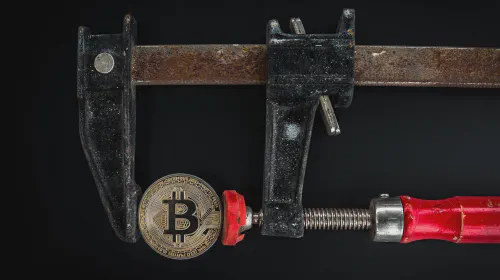How Do Blockchain Miners Get Paid? | Explained in Detail
Salomon Kisters
May 13, 2022This post may contain affiliate links. If you use these links to buy something we may earn a commission. Thanks!
When was the last time you thought about investing in crypto? Despite the recent downturn in the market, cryptocurrency investing remains popular - especially now with buyers seeking bargains.
Yet, the sheer number of crypto projects and the research involved in finding hidden gems can be a challenge for even the savviest retail investors.
Therefore, blockchain mining might be a way forward. Cryptocurrency is entirely digital and comprises long chains of code. Mining is the process of solving complex mathematical puzzles in order to produce “coins.”
Miners may team up to mine to win or earn crypto-currency. For example, the current reward for successfully mining Bitcoin is 6.25 Bitcoins, having a value of about $250,000. Bitcoin miners working in larger groups get paid less, although they frequently earn more.
What is Blockchain Mining?
Blockchain mining refers to the alternative method of earning cryptocurrency using computers to go through or decode ‘blocks’ of code to make money. Figuring out a 64-digit hexadecimal number is the key to finding the cryptocurrency.
Each currency, like Bitcoin or Ethereum, has its reward in terms of the amount of cryptocurrency you receive. You use a mining rig to ‘hash’ the data blocks and win. Blockchain mining is a bit like playing a video game in the sense that you attempt to solve complex equations related to blockchains and win cryptocurrency if you get the correct answer.
How Do Blockchain Miners Get Paid?
As pleasant as the prospect of earning in terms of the most valuable currencies in the world seems, it is easier said than done. Blockchain mining is difficult and nearly impossible for a single average user.
To analyze, break down, and read a block of code (called hashing the code, for the more technically sound!), the computing power required far exceeds what your laptop or personal computer can draw out.
One needs a mining rig for successful blockchain mining: a quick computer with an upgraded RAM space, expensive processing units, and heavy-duty fans to cool down the unit to have a fair chance of successfully mining crypto. The rig will then hash blocks of code sequentially to find embedded cryptocurrency. When it reaches the correct code, you win.
What Do You Need for Blockchain Mining?
Mining Software
Apart from your mining rig, you must download special software to have a channel through which you can mine blockchains. Depending on your hardware, region of activity, and cryptocurrency, you can choose from various mining applications.
Mining Pool
Working as a team with fellow miners is probably a wise choice. This tactic works because your chances of successfully mining blockchains will dramatically increase if you have partners. Each partner can hash through different blocks and combine their computing power to work faster and achieve a better’ hash rate.’
Cryptocurrency Wallet
Unlike paper currency, you cannot hold or touch cryptocurrency. Therefore, you need an online account at any designated Crypto-dealer called a ‘wallet.’ Whether you earn crypto through blockchain mining or buy it, your currency transfers to your wallet through which you can make transactions or liquidate.
Keeping these points in mind is worthwhile since you can save time and maximize your chances of winning, especially if you are a full-time miner. This move can also protect you from some of the expenses of setting up a heavy mining rig.
Where Is Mined Cryptocurrency Stored?
Each cryptocurrency has its method of payment and reward policy. For example, Bitcoin mining currently pays 6.25 bitcoins for each mined block. By 2024, the reward will be 3.125 bitcoins.
Limitations Behind Blockchain Mining
With great power comes great responsibility! Mining rigs have a trade-off. Many users feel it’s a gamble because you have to face some very real consequences of having a mining rig for a reward based on chance.
Electricity usage and expenses
Mining rigs with three or more GPUs are electricity guzzlers. A mining rig uses more than 1kW of power when turned on, more than a medium-sized AC! Crypto mining plants have to pay large amounts of money for electricity bills since they must run multiple mining rigs. These bills can be very expensive for an individual miner, specifically if you do not win.
Commercial bitcoin mining operations like Hut8 run thousands upon thousands of computers simultaneously, all trying to crack bitcoin transactions in order to earn block rewards. A single CPU operating from someone’s home is probably going to be at a significant disadvantage.
Bandwidth Usage
Blockchain mining is a cut-throat business. Using an unlimited, unmetered, and reliable connection is vital to running a successful mining operation. However, if you live in a region where the power supply is unstable, you might have to rely on mobile data or a network that charges per kB or MB of internet, increasing your expenses again.
Hardware Damage and Overheating
Buying a mining rig, individually or pooled, is expensive. Cooling the rig is vital since it generates large amounts of heat while hashing data during blockchain mining. Paying for the possible damages to your mining rig, from overheating or overuse, can be very expensive and waste valuable time. You must also install a designated AC for your rig if you live in a hot region.
Orphaned Blocks
Sometimes, opposing miners might reach the same data block simultaneously. In this case, both miners automatically redirect to new separate blocks, and the data block left behind is called an ‘Orphaned block.’ If the orphaned block had the crypto embedded in it, the miners’ time goes to waste along with their money.
Legal Issues
Blockchain mining is illegal in some parts of the world. Legality issues are prevalent in places where cryptocurrency is not recognized. Therefore, blockchain mining can be a big issue in such regions. Miners who want to profit from crypto cannot enjoy the experience due to law and order in their country, making legality a primary factor behind mining.
Tax Laws
Blockchain mining is not nearly as profitable as miners expect. Apart from the expenses it entails, crypto is a taxable source of income by the IRS. Furthermore, your profits may freeze if you do not pay your taxes. Investing so much in blockchain mining only to pay high taxes discourages first-time miners.
Bitcoin (BTC) or Ethereum: Which is harder to mine?
Bitcoin mining has been rampant since the cryptocurrency came into active circulation in 2009. Then, the reward for successfully hashing blockchains for Bitcoin mining was 50 BTC. However, the payout has been halving every four years and will be 3.125 BTC by 2024.
Contrary to popular belief, Ethereum mining is harder. Despite Bitcoin being the most valuable cryptocurrency right now, Ethereum mining rigs use larger amounts of electricity and dynamically vary their electrical load compared to Bitcoin rigs. Moreover, most users have mining rigs relying on computer chips that favor Bitcoin mining. Ethereum requires graphics processing cards for efficient mining.
On the other hand, Ethereum transactions take about 10 seconds, while Bitcoin blocks need 10 minutes for new chains to add. According to industry sources, 14 million Ethereum blocks have been mined already, compared to 700,000 for Bitcoin. Ethereum miners earned around $17 billion in 2021, while Bitcoin miners earned around 13.6 billion.
Therefore, it is a question of personal choices and circumstances regarding which crypto mining one should invest in. Those willing to spend more money on the actual mining process might be willing to go for Ethereum, while those who want to test their luck on the higher valued currency might consider investments in Bitcoin.
What Do Economists Predict About Blockchain Mining?
Opinions on Blockchain mining are diverse. Some predictions are favorable and cite that blockchain mining is the future since crypto is on the brink of global acceptance, according to https://www.investopedia.com/.
With branchless banking, online wallets, and crypto payment options worldwide, blockchain mining might be the next best thing since gold.
Some economists, however, predict that Bitcoin is an uncertain and risky investment due to its high volatility, speculation, and lack of regulation.
If people lose confidence in Bitcoin as a viable payment option or store of value, the currency’s value will plummet. Ethereum seems to have a better future based on the strength of the network and the thousands of use cases and projects that are on the Ethereum blockchain already.
Conclusion
Cryptocurrency may have a bright future, but the market now is uncertain, with Bitcoin and Ethereum experiencing a major pullback. Instead of spending money to buy cryptocurrencies, many would-be investors are exploring blockchain mining instead.
There are many sources and applications through which one can start mining right away. However, one must have realistic expectations when investing in blockchain mining equipment.
Stay informed with the latest insights in Crypto, Blockchain, and Cyber-Security! Subscribe to our newsletter now to receive exclusive updates, expert analyses, and current developments directly to your inbox. Don't miss the opportunity to expand your knowledge and stay up-to-date.
Love what you're reading? Subscribe for top stories in Crypto, Blockchain, and Cyber-Security. Stay informed with exclusive updates.
Please note that the Content may have been generated with the Help of AI. The editorial content of OriginStamp AG does not constitute a recommendation for investment or purchase advice. In principle, an investment can also lead to a total loss. Therefore, please seek advice before making an investment decision.

Ethereum vs. Ethereum 2.0: Key Differences Explained
Understand the key differences between Ethereum and Ethereum 2.0, including the shift from PoW to PoS, scalability improvements, and the introduction of sharding and Beacon Chain.

The Mystery of the Message in the Bitcoin Genesis Block
When Satoshi Nakamoto created Bitcoin, he left a secret message. What is it, and what does it mean?

Can The Blockchain Be Hacked Or Attacked?
Blockchain technology and cryptocurrencies have seen a massive surge in popularity. Can they be hacked?
Protect your documents
Your gateway to unforgeable data. Imprint the authenticity of your information with our blockchain timestamp